452 Search Results for VISUAL SUPPORTS
April 20, 2013
by Carole Zangari -
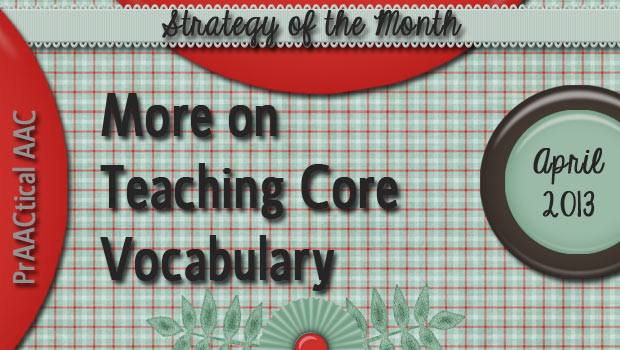
Last week, we talked about two key strategies for teaching core language: using aided language input and creating frequent opportunities to teach and elicit core words. In today’s post, we’ll expand the number of words and discuss two additional considerations for teaching core words. Aided language input is always important in working with beginning users of AAC. It exposes them to their new means of communication, provides them with a competent model of their AAC system, and introduces them to words and symbols they don’t yet know within a meaningful context. It also forces us to slow down when talking, something that can be very beneficial when you consider that many beginning users of AAC also have difficulty processing oral language. (It may take them longer to decode what they’re hearing and they may have to concentrate more than the average kid.) If you’ve actually tried pointing to symbols as... [Read More...]
April 1, 2013
by Robin Parker -
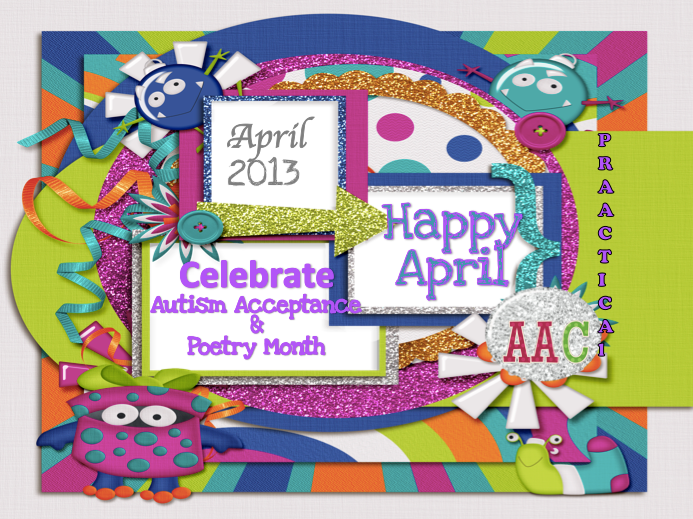
There are a lot of celebrations this month. It is officially Autism Awareness Month. A new name for this that has popped up & taken hold is Autism Acceptance Month. Awareness and/or Acceptance seems to mean different things to different people but hopefully the intent is similar. We hope that this month is filled with great ideas to support ALL people with autism and their families. We hope that educators, clinicians, and whole communities are inclusive, that they presume competence, and that they support communication and language using best prAACtice information and research. We do know that there is more to hope for than just this, like better employment outcomes, more appropriate accommodations, and more individualized support but if focus stays on the former, it seems then that the latter would improve. Plus we have more control (if there is such a thing) on facilitating inclusivity, presuming competence, and of course... [Read More...]
March 30, 2013
by Carole Zangari -
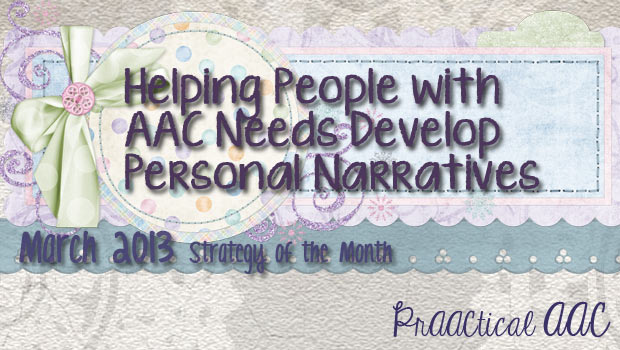
Where I come from, we value our independence. We look forward to the day when we can move out of our childhood homes into our first apartments. We’re intensely proud of our kids when they first do things on their own. We feel honored do to our first professional presentations or fly solo on a publication. We are driven to be independent in our professional and personal lives. Independence is all well and good, but sometimes we get caught up in thinking that it’s the most important thing for our clients who use AAC. Many times, it’s not. As SLPs well know, communication is a social act. Without the cooperation of another person, there is no communication.We need other people in order to communicate and we need them even more when we’re just learning. Independence is something, but it isn’t everything. For AAC learners, interdependence plays an important role. We love... [Read More...]
March 26, 2013
by Robin Parker -
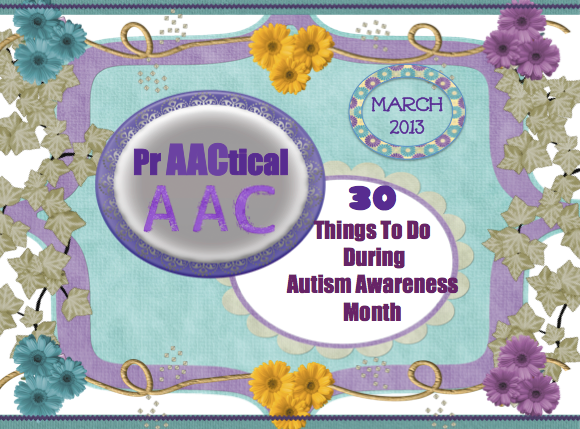
We love getting EVERYONE involved in Autism Awareness/Acceptance Month. We like to take a goal focused approach to our autism activities by choosing projects that facilitate autism awareness & acceptance, positive attitudes, and autism & communication learning. We pass out materials, have contests, go to events, do extra talks, and try and engage EVERYONE we know and even some we do not know. We do a lot of shopping (with small amount of money, but we have to EAT and accessorize). Our families, pets, friends, and students all participate. It is a month filled with purposeful fun. Here are some of the things we will be doing. Please share any activities or projects that you know about. Read & share 5 references that support the use of AAC & Autism (evidence based research) Check out the Online Autistic Carnival which is currently accepting submission of various video documentaries (music, art, writing,... [Read More...]
March 23, 2013
by Robin Parker -
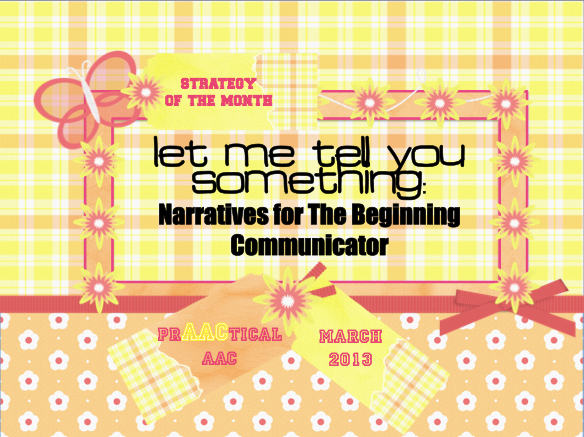
March continues with story telling or narratives as the Strategy of the Month. All learners have stories to tell but some may need special teaching to be able to express their stories. Goals for the beginning communicator can and should include narratives. Personal narratives are a good place to begin but any type of narrative can be taught with structure, routines, partner support, prAACtical strategies. Robust communication includes story telling. Yes, beginning communicators need to be able to express wants and needs however, authentic and comprehensive language involves much more. The quicker we start teaching, the quicker beginning communicators (or anyone) can learn. Beginning Communicator Narratives 3 Types (Just some of the options) Remnant Books are a visual and tactile way of telling stories by recording important events. Learners can help choose items from meaningful personal experiences which serve as a reminder of stories to tell. Create routines and visual supports... [Read More...]
March 18, 2013
by Robin Parker -
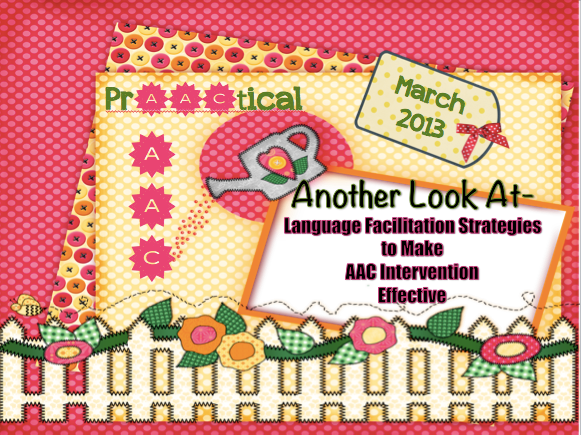
Language Facilitation Strategies The Art of Scaffolding Recasting: A Language Facilitation Strategy F is for Feedback Don’t Miss These Visual Supports & The Chance to PrAACtice Language Facilitation Strategies PrAACtical Teaching Aided Language Input Pivotal Skills for AAC Intervention: Aided Language Input Why We Love Aided Language Input Aided Language Input Demo Learning to Use Aided Language Input Teachers in AACtion- Aided Language Input 5 Ways to Elicit Language Without Asking a Question Don’t Ask: 5 Reasons to De-Emphasize Questions in Your AAC Therapy 5 Tools to Make Aided Language Input Easier F is for Feedback Video
March 16, 2013
by Carole Zangari -
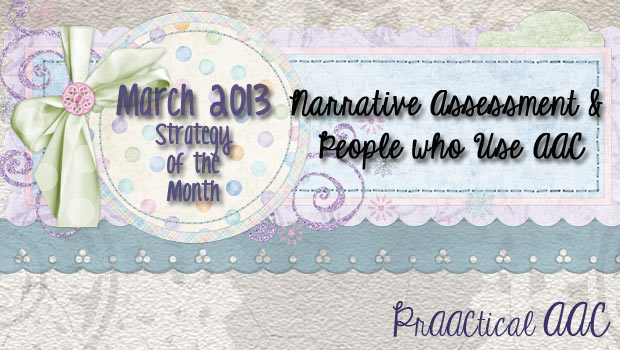
This month, we’ve been talking about building narrative skills in our AAC clients. We tried to build the case that including narrative language goals in our intervention allows us to help people who use AAC to participate more fully in social exchanges, relay more in-depth information, and achieve greater academic success. But how do we know where to start in narrative intervention? And how do we measure progress? In this post, we share some thoughts on the assessment of narrative language in AAC. Most test batteries that assess narrative language are designed to take a snapshot of what the learner has already mastered in terms of telling personal narratives, story retelling, or scripts. This allows us to look beyond MLU, morphology, and grammar and can be useful in determining whether intervention is needed. Some scholars, however, have noted the limitations of this “one shot” approach, particularly for learners whose communication... [Read More...]
March 15, 2013
by Robin Parker -
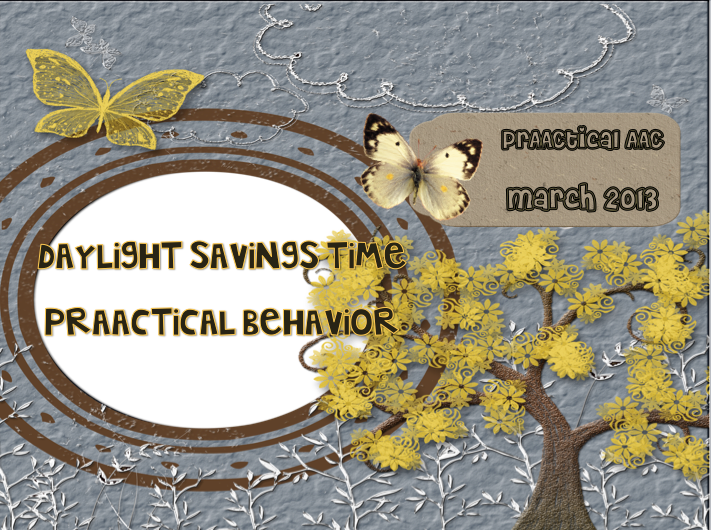
We have noticed that daylight savings time has been difficult for some of the learners that we know (for more about this see Karla Fisher’s ASD page). Sleep patterns seem to have been out of whack which in turn may lead to some re-emergence of behaviors that may pose challenges in speech-language sessions. However, instead of getting frustrated, this is the time to get more organized, teach more high priority communication (“need an extra break today”), and in some ways be more flexible. Be prepared to use the visual supports that keep learners focused, highly interested, and organized. By staying with the basics, there will be no need to sacrifice in AAC & language learning time. Remember to Use: Choice Boards– Give lots of choices. When we choose what we do, we are more likely to be interested and participatory. The session goals can remain the same but a... [Read More...]
March 9, 2013
by Robin Parker -
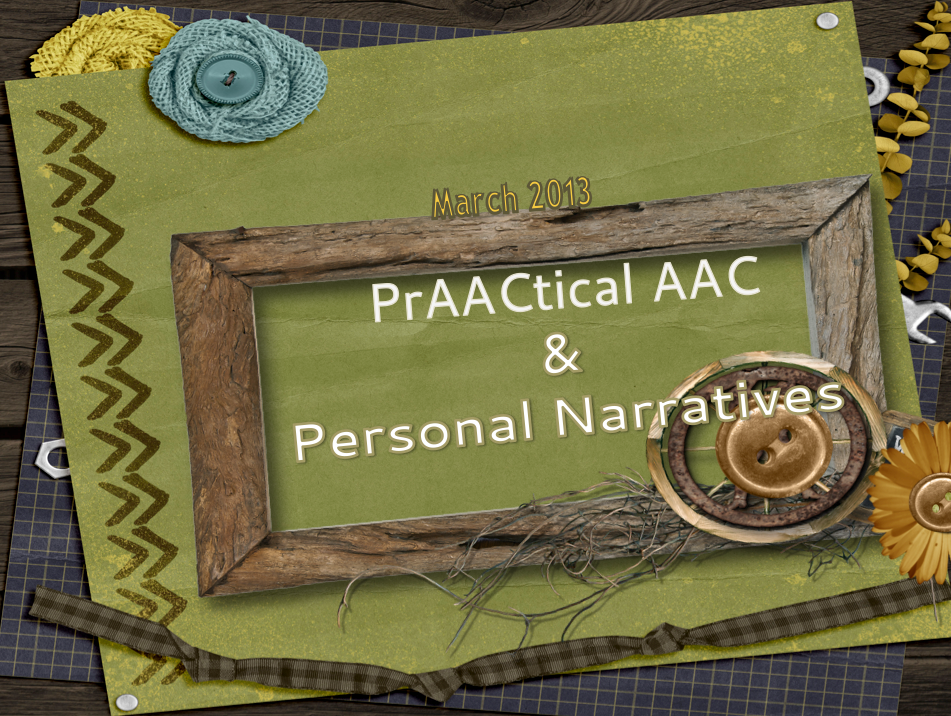
Personal narratives are the first story skills that develop. They tell about ourselves and our connection to activities, places, and events. They tell about how we feel about people and experiences. Personal narratives help us structure and organize the events of our lives and even become a way of thinking about ourselves and our identities. We know many AAC users have significant difficulty with narratives. We always wonder though, is it a function of language difficulty or of access, exposure, and PrAACtice or more likely a combination. There are key intervention strategies that help AAC learners be able to tell personal narratives. You probably won’t be surprised by what strategies work but the research from Gloria Soto and colleagues has shown us that when applied to personal narratives, AAC users can be competent story tellers. Some Thoughts on Personal Narrative Assessment Even before assessment of the AAC learner, in all fairness,... [Read More...]
March 6, 2013
by Robin Parker -
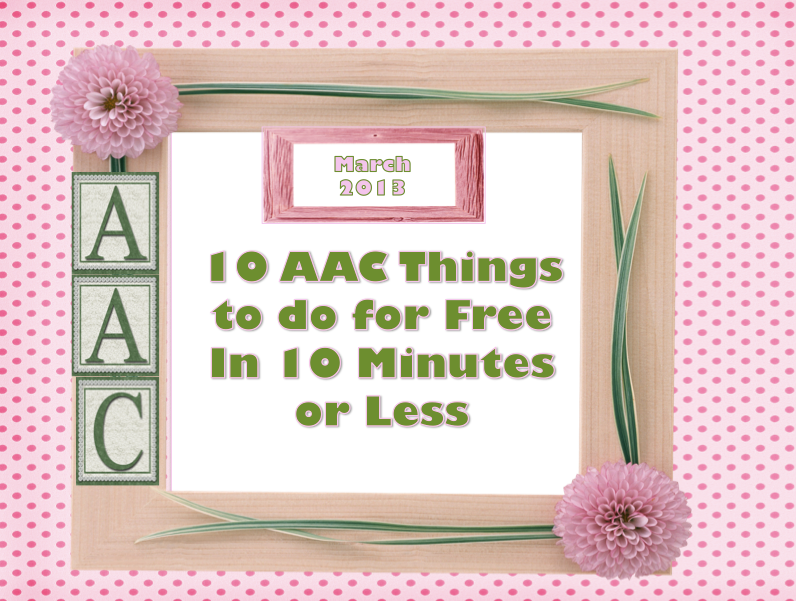
Subscribe to a blog with an AAC focus– Spectronics Blogs, Uncommon Sense, Jane Farrall Consulting, PrAACtical AAC Program a one hit message device and use it for a new reason– 101+ Things to do with a Big Mac or Other Single Message Communication Devices Follow an AAC topic Pinterest board– PrAACtical AAC, AAC by Katie Ahern, AT/AAC/Adapt/Modify/Accessibility/Accommodations, AT for Communication, AAC by Constantly Speaking, Communication-AAC Print out and hang up or give someone an AAC Awareness Image– 10 Commandments of AAC Devices, AAC It’s as Easy as 1,2,3 Register for a free AAC professional development webinar from Ablenet Print out an AAC Poster– AAC Boot Camp-Getting AAC Users to Communicate, The Periodic Table of AAC, Learn about technology and apps for AAC and learning from Pinterest– Lauren Enders Pinterest Boards, Tech in Special Education Print out song visual supports Read a Tar Heel Reader Book with an AAC learner... [Read More...]









